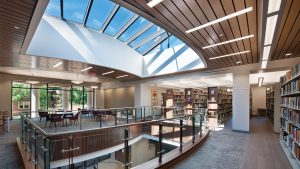
Those who visit the Barbour Library at Pittsburgh Theological seminary immediately encounter an extensive collection of theological resources—the largest in the tri-state area—in a beautiful facility, newly renovated in 2018. Clergy, graduate students, and members of the general public may visit to make use of soundproof study rooms, an active learning space, and the Fred Rogers Family Room (in honor of PTS alumnus Fred Rogers), featuring a collection of children’s books, child-sized tables, and a play theater in the theme of Mister Rogers’ Neighborhood.
Those who dig more deeply find that, in addition to the nearly 300,000 resources available in circulation, the Barbour Library’s archives host rare and, in some cases, utterly unique historic documents. Mark Russell, the library’s reference & instruction librarian, aids those searching for particular pieces of history within the Barbour archives. For National Library Week, Mark showcases some of the archive’s resources and describes their value for staying in touch with local, ecclesial, and personal histories.
Records Keep Us in Touch With Personal Histories
“One guy came to me looking for information on Fitz Patrick Stewart, who had been [formative] in his fraternity,” said Mark Russell, research and instruction librarian. “When I shared that picture [of Stewart] with him, he had an emotional reaction, saying, ‘He is a part of my legacy; I am a part of the tradition [he shaped].’” Mark also aids the many people who seek his assistance in their work on personal genealogies and family history, as the Seminary holds unique records pertaining to its alumnae/i, staff, and faculty. Some records, such as old matriculation books, have handwritten names, addresses, and signatures, which can be particularly significant to those seeking connections with their histories. “It’s personally meaningful to the people doing it,” says Mark. “It’s good to be able to assist them.”
Historic Volumes Preserve Church History
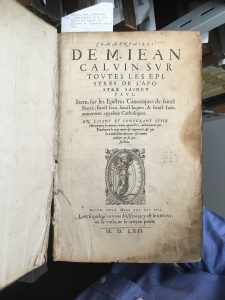
In addition to records significant for personal histories, the Seminary also houses records relevant to broader interests in church and cultural history. The library’s Finney Room houses the Warrington Collection, a collection of hymnals from as early as 1530 in impeccable condition. Some hymnals here are the only copies of their kind. “I get e-mails from people in England [saying], ‘hey, we’re looking for this hymn; you’re the only one who has it,” Mark shares. Locally, PTS students visit this collection each year as a part of the “Exploring Christian Worship” course.
Further, the library’s Anderson Collection houses Bibles, commentaries, and other theologically significant volumes dating as early as the 15th century, including incunabula and copies of Calvin’s commentaries on scripture that were published within the author’s lifetime.
Digitization Makes Local History More Accessible
The library’s commitment to church history also includes keeping a collection of ephemera from Presbyterian churches, particularly within the greater Pittsburgh area. In March 2024, the Barbour library received an Atla digitization grant to make a selection of these materials accessible on the Seminary’s own server, the Atla Digital Library, and the Presbyterian Historical Society’s online collections.
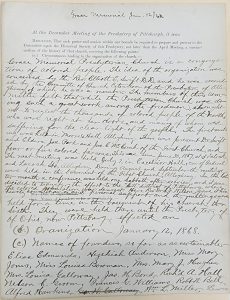
“We would like to first preserve and make accessible the items that are in the public domain, with a focus on church history pamphlets, early sermons, church records, and other documents related to Presbyterian Church history in the Greater Pittsburgh area,” writes Michelle Spomer, library director. “These materials represent the beginnings of both noted churches, such as East Liberty Presbyterian Church . . . as well as those that have completely disappeared, or that have morphed and merged into new congregations . . . . The impact of this digitization project has the potential to be far-reaching . . . . Locally, the Pittsburgh Presbytery and Presbyterian churches will likely learn more about their origins . . . Scholars of American and church history, both nationally and internationally, will find unique items to supplement their research. And lastly . . . we hope that making these items accessible will help us to forge archival relationships with some of the underserved and underrepresented churches in the Greater Pittsburgh area.”
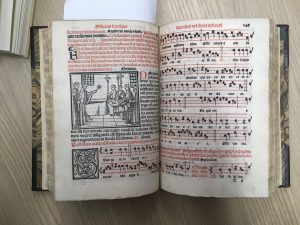
Mark, likewise, reminds us that stewarding this collection of materials, both locally and globally relevant, is not only a sterile exercise in the preservation of records, but keeping tangible pieces of history has a very human aspect as well. “Being able to find what people are looking for . . . it’s a special experience. It’s unique. It’s the whole reason archives exist,” he says. “The fact that these materials are all here together is kind of an amazing thing in itself. That they’re valuable to be engaged and used is wonderful. We have so much history in this collection. Being stewards of that collection is a great honor.”
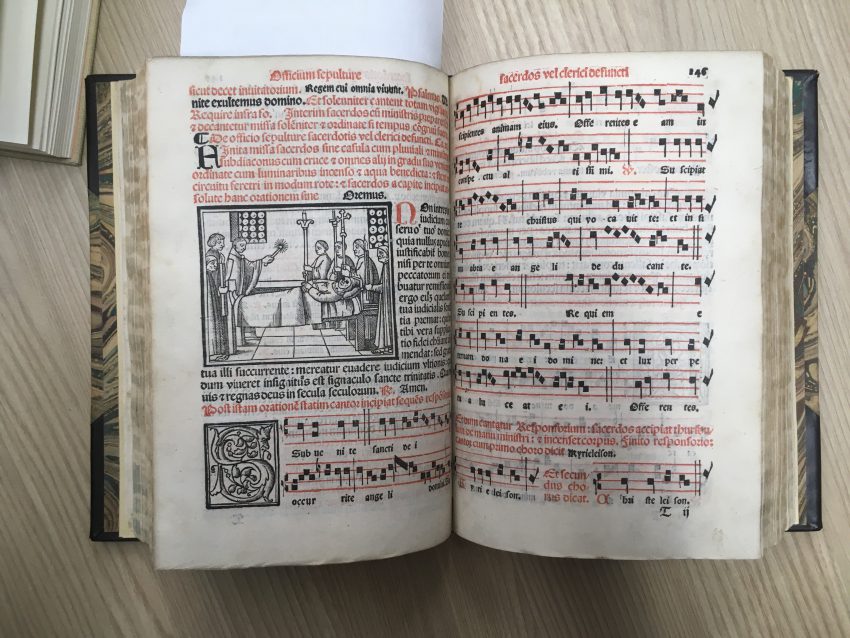

2 thoughts on “Making History Accessible: the Archives of the Barbour Library”